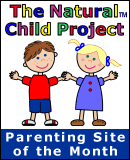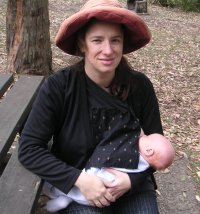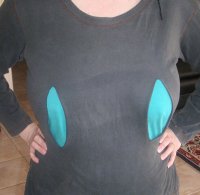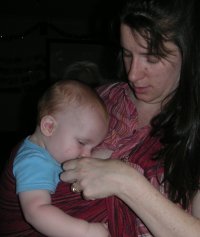|
| |||||
|
|
|
||||
|
Tribal Baby Home Nappy Free Baby How to Start? How We Got Started Part Time DIAPER Free Part Time NAPPY Free Thrill of the First Catch Timing, Cues & Signs Prime Times for EC Baby's Point of View EC Clothing Directory My Grandma and EC Modern Cloth and EC Breastfeeding and EC Wearing Baby and EC EC in China Naked Bottom Time Practicing with Knickers Musing on Misses... Wee Miss Ponderings... EC at Night? Crawling and EC EC Changes - Adapt! New Signals to Spot Towards Independence Potty Practice Keeping Regular Dads Point of View Our Progress Links to Resources
Sleep Sharing |
Breastfeeding
Future proofing my baby! When I was preparing and knew I would be 'breastfeeding on request', I found info on WHY to do this quite easily, but I did find it hard to find stories by mums online that explain the minutiae of doing this, the day to day supportive stuff and little things to help keep one's brain 'straight'. I have since found ways to help myself manage, have found out how to adapt ideas into my own ways, have found helpful support and resources online and in books. So, I am adding this section to provide another place to read of a mum who feeds in this way, and how I have adapted to it and what it has taught me about my baby. There is heaps of info about breastfeeding successfully available - the key is only taking on advice from people who HAVE breastfed successfully or risk adopting out of date and potentially damaging information. To guard against such tripe, Kellymom.com has a great read: Handling criticism about Breastfeeding I'm lucky to have only ?? encountered such poor information when going to Baby Clinics, which I now avoid like the plague, how sad. Knowing that breastfeeding is simply normal is important. The Australian Breastfeeding Association is the place for real help, completely up to date information based on scientific, evidence based research and women's experiences on all breastfeeding related matters: They have a great Breastfeeding Helpline for any Mums, Dads, family to call and ask about any breastfeeding questions. The counsellors are really helpful and have up-to-date training and experience with breastfeeding, of course! Breastfeeding phone Helpline and email Counselling Services Unrestricted Breastfeeding Unrestricted breastfeeding, breastfeeding on cue, breastfeeding on request, breastfeeding to need, like a gypsy, on cue, continuously, all terms nicer than 'demand' feeding, which sounds negative - plus, baby doesn't need to 'demand' feeds by crying unless their earlier signs are missed. Within a few months we learn their earlier signs - wiggling, rooting with the mouth, the fishy-mouth searching, twisting around, behavioural signs, eye signals - looking for the source! Supporting this instinctive behaviour as much as is possible allows the baby to find their own natural feeding intervals and patterns. In the big picture I have found it the easy road to travel.
I had a baby that fed very frequently and often, and for a long time! I thought this was fine and normal (and it is) until I went to a 'new mothers class' and was told to delay feedings and schedule feed him every 3-4 hours. This was a 12 week old baby! NO WAY! That sort of advice is forty years out of date, based on artificially fed babies, not on breastfed babies, who are fed to their needs. Sure, some babies naturally grow into that sort of feeding pattern, but forcing some mother-baby pairs to do so will adversely effect their supply, and cause a very unhappy baby. An adult will have something in their mouth on average every 90 minutes, a drink, a snack, a meal, why expect a teensie baby to starve for hours? Bizarre. Luckily I had attended Breastfeeding Education classes run by the ABA, so I knew better! I also decided to report this (and other crap advice) to the head office, and re-education was put into place. Turns out that it was NOT what was supposed to be taught. (der!) I read in an article about
breastfeeding that : My Baby's Breastfeeding Pattern Over Time Unrestricted breastfeeding is a natural instinct for baby - I find at those times I can allow it, baby will feed little bits quite frequently. He fed really often in the morning as an itty bitty - basically all morning! Then a sleep and less often in the arvo. Overnight he fed two hourly for 6-7 months, then started 2-3 hourly feeding at night until 11 months, by which time he had some spells of up to seven hours (weird). Moving interstate then brought back two hourly for a week, then teething and so on would cause a night or three of even hourly feeding! I rolled with it as best I could - napping in the morning or early evening when hubby was home, or during the day with bubs, mostly I found the breastfeeding itself relaxing due to the hormones, so that would be my 'relaxation' time. He has always fed frequently during the day - usually every hour or two at home. Sometimes a quick drink, sometimes a long feed. When he was small especially I was astounded that he seemed to be 'awake' all day - until I realised that his leisurely feeds were his sleep time - he re-charged sleep-nursing. I made sure to rest! After the first 5 or 6 months he'd be quite happily distracted on outings and go 3-4 hours. He went six hours one day - the next I had a blocked duct! By 16 months he was 'sleeping through' for five hour blocks for a few weeks, then he got a bug, back to 2-3 hourly for a while, after a 24 hour spewing virus and on-the-boob hydration/immunity swapping every hour. He recovered so fast it was amazing (not really considering the boobs are super magic white-blood makers of liquid- gold living wonder- fluid!) He is now easing back to his four hour pattern at night and all over the place in the day - some times quick feeds hourly, sometimes long gaps. I really don't notice - hubby asks me how often he feeds, I actually can't give an answer - I have tried to record it - but never remember to write it down as it happens so naturally I don't think of it. I read that 20-40 times a day is 'normal' in this sort of feeding pattern - he'd easily feed 20 times a day. This gradually ebbed and flowed through his second year of breastfeeding. Around two it was changing - less feeds overall, stages of "boob marathons" of course thrown in there! He would go all day not feeding when we are out ( a quick feed for a nap perhaps). I realised I wasn't feeding so often, though I'd simply find him attached it seemed like, breastfeeding is so automatic. At home, he'd do the 'maintenance feeding' cycle - quick feeds every hour or two, then off. As usual, with a bug, on all day - then a runny nose the next day would 'explain' why he had been glued to the boob! Breastfeeding my Nappy-Free Baby - Breastfeeding and EC
Frequency and Capacity Frequency of feeding is related to capacity - of baby and boobs! I have boobs with a smaller holding capacity, so I naturally need to feed more often during the day and night. Baby has a really small belly, from a marble to the size of their clenched fist - breast milk digests easily and quickly, is low in fat for the frequent feeds we are designed for. Babies have no time sense, they don't remember just having had a feed - if they are hungry, they are simply hungry, and ready for a feed again. Filling that need for the breast I found very empowering to my confidence - trusting the baby, following his needs - he would be happy, so I would feel relaxed and as confident as a new mum can be. Even when it seems imposing and never-ending (I'm sure all I did was breastfeed for 6 months?), accepting it, immersing myself in it moment by moment, was good advice I received - cherish the time - it won't last. Very interesting is knowing: Further, Dr. Hartmann noted that the women who had larger storage capacities often nursed at longer intervals, whereas women with smaller storage capacities nursed naturally at more frequent intervals. [Comment: breast size appearance is not always a good predictor of production or storage capacity]. Most importantly, it was noted that all of these women had the ability
to produce plenty of milk over 24 hours; what varied was the maximum amount that
they could deliver at one sitting." I recently read an article on Bawling Babies called "Breastfeeding: A Lifelong Investment" I was excited to read Maven's exact pattern right there - that I had actually managed to support his instinctive behaviour in a Western society so closely: "The pattern of breastfeeding that results when an infant is never separated from the mother is very different from that we believe to be “normal” in our western culture. Firstly – the pattern is entirely determined by the infant and not the mother, and each infant is unique. An
infant allowed to decide its own feeding pattern from initiation will settle in
to “maintenance” feeding, and will feed every hour or two at most, will
ingest the full ejection load of a single let down reflex, which just happens to
be the comfortable maximum capacity of its stomach, and which happens to contain
enough food and calories for one or two hours at most, and it will cycle its
state organisation effectively. This is the pattern observed from almost all
non-western cultures" "He Can't Be Hungry. He Just Ate!" is a great bit of "knowledge is power" to read and understand about how babies eat. "How many times did you eat or drink something today? Coffee break? Water fountain? Gum? Snack? TV nibblies? Most adults have an urge to eat about every 90 minutes while they're awake! Why do you eat or drink? Hunger? Thirst? Comfort? For social reasons? Just because? Are you trying to gain weight? If you had to double your weight in 6 months, how would you do it? Would you drink water? Chew sugarless gum between meals? Eat large meals at long intervals? Or would you do lots and lots of snacking, day and night? When it comes to food, babies are people, too. They're people plus, because they are trying to double their weight in about half a year, with a stomach that starts out no bigger than a golf ball. Of course they eat and eat and eat, especially in the early weeks. If your newborn is gaining about half a pound a week, he's doing well. If not, a breastfeeding specialist can help you find ways to help him nurse more effectively. Remember, if milk doesn't go in often, pounds can't go on fast. " Source: www.wiessinger.baka.com Ecological Breastfeeding
If you practice ecological breastfeeding:
Basic Principles of Ecological Breastfeeding and natural child spacing:
More information: http://ccli.org/nfp/ebf/summary.php Ways to adapt to cue feeding
Nipple discussions - interpreting feeding behaviours Over the months I have slowly learnt "boob language" - the signs baby gives via his feeding style at the boob. It is a funny language, a difficult one to learn and then to remember to listen to! Plus, I get it wrong quite often. It is still something fun to practise though. What does that particular flutter mean? Ah- a burp. It is a non-verbal language to be sure, likely individualised to each mother-infant pair to a certain extent, I know some are certainly instinctual. It is interesting to learn, I find it an ongoing challenge to interpret what he is attempting to communicate to me; after all, we practise these ‘nipple discussions’ every day and night! (Night is often a good time to focus in and learn, as baby's behaviour is so instinctive at night.) Here are some of the ‘phrases’ that I understand bubs is speaking by the way he feeds from me: Easy suck feeding means "I’m having a quick drink" (while I’m looking around at the same time). Strong suck feeding means, "I’m hungry foody, may then go to sleep, ahhhh" Flutter-pause, flutter-pause feeding usually follows ‘strong’ feeding, and means ‘I’m winding down now, but still want more!" Fluttery Butterfly feeding means "I’m making my next meal" (stimulating supply) Gentle but continuous Fluttery Butterfly feeding means "I’m fighting a bug" (exchanging antibodies- clear as he’ll not allow this to end before he is ready, on occasions he’ll do it for a couple of HOURS, then I know he’s been exposed to something. I encourage this after he has the jabs, or if one of us is feeling low.) Popping on and off the breast while feeding means "I need to pee" Plucking at the boob while feeding means "I need to poo" (or fluff!) Nibbly feeding means "I need to have a burp, my belly feels yuk" (or a need to fluff!) It is an irritating sign. Breastfeeding is just so cool; it is the most helpful mumming tool! Having a 'highly instinctual' baby from when he was an itty bitty, I have learnt a number of things over time by offering the comfort of breastfeeding to him whenever he requested it, or I felt he needed it or whenever I had no idea what he wanted!
Basically, I have learnt that I don't need to know anything - I don't need to know if he is feeding more often due to a brain burst, fighting a virus or bug, increasing his food supply, teething yet again, coping with a stress during the day or perhaps all of these at once! All I need to do is trust him and offer the boob - so easy really! Helpful internet resources supporting instinctual care of baby through breastfeeding on cue: Australian Breastfeeding Association www.breastfeeding.asn.au The Natural child project www.naturalchild.org such as So I nursed him every 45 minutes Examining the Evidence for cue feeding of breastfed infants Examining the Evidence for Cue Feeding www.kellymom.com for example frequent nursing Gentle Birth, Gentle Mothering:The best possible start by Dr Sarah Buckley Thoughts on Breastfeeding by Kathy Dettwyler Dr Sears Breastfeeding Information at www.askdrsears.com
Online communities supportive of breastfeeding: Australian Breastfeeding Association Forum ABA Forum Extended Nursing Forum Extended Nursing Baby Web Central www.babywebcentral.com.au Alternative Baby www.alternativebaby.net Books supportive of breastfeeding on cue :
Discover More About Part Time Elimination Communication (EC) Click on the appropriate banner below to see how EC can aid your breastfeeding confidence. |
||||
|
|
|
||||
 Tribal Baby
Tribal Baby

 What
is it?
What
is it?
 Breastfeeding on cue,
to baby's 'request' is what a baby biologically
expects. Over time they learn through give and take to communicate and wait a
few moments for a feed. It is quite natural for a baby to feed several times an hour. The
San people of Africa, perhaps the last remnants of early human behaviour, fed
every 13 minutes, so several times per hour for short bursts. Because of this
their natural child spacing is four years apart, as hormone levels are kept high
due to the frequent day and night feeding; natural behaviour for the 'carrying'
species we are.
Breastfeeding on cue,
to baby's 'request' is what a baby biologically
expects. Over time they learn through give and take to communicate and wait a
few moments for a feed. It is quite natural for a baby to feed several times an hour. The
San people of Africa, perhaps the last remnants of early human behaviour, fed
every 13 minutes, so several times per hour for short bursts. Because of this
their natural child spacing is four years apart, as hormone levels are kept high
due to the frequent day and night feeding; natural behaviour for the 'carrying'
species we are.

 One
term I first learnt about on the ABA Forum related to cue feeding is "Ecological breastfeeding" - is a style of feeding that is known to
most strongly support instinctual breastfeeding by the baby, and the
fertility-reducing benefits of breastfeeding. Turns out it is what I was doing
naturally! It is why traditional natural
cultures had 3-4 year spacing between births. There are certain guidelines that
are best followed:
One
term I first learnt about on the ABA Forum related to cue feeding is "Ecological breastfeeding" - is a style of feeding that is known to
most strongly support instinctual breastfeeding by the baby, and the
fertility-reducing benefits of breastfeeding. Turns out it is what I was doing
naturally! It is why traditional natural
cultures had 3-4 year spacing between births. There are certain guidelines that
are best followed:
 Night
nesting - sleep with the baby to aid in night feeds of the most
ease possible - staying warm in bed. I have found feeding at night easiest
with a top like this - with slits cut into it so I do not need to rouse to
help baby attach during the night - he has free access as I position him at
the right height and sleep curled around him! It is just so stylish, hey!
Works, though. Absolute minimal waking in
winter this way. Brrr, minus 7 degrees here, ouch!
Night
nesting - sleep with the baby to aid in night feeds of the most
ease possible - staying warm in bed. I have found feeding at night easiest
with a top like this - with slits cut into it so I do not need to rouse to
help baby attach during the night - he has free access as I position him at
the right height and sleep curled around him! It is just so stylish, hey!
Works, though. Absolute minimal waking in
winter this way. Brrr, minus 7 degrees here, ouch!
 What I have learnt through
breastfeeding to baby's cue:
What I have learnt through
breastfeeding to baby's cue:
